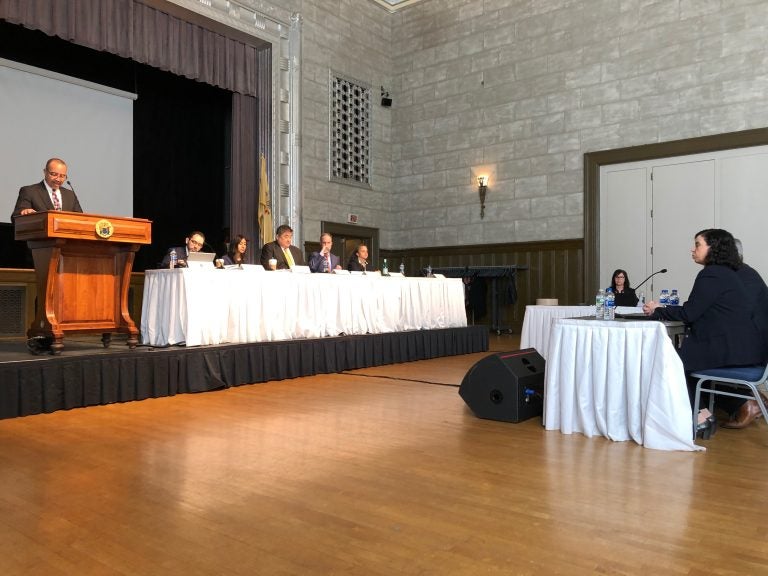Former N.J. employee says her company lied to get multimillion-dollar tax break
Hearings are underway on N.J. awards of tax incentives to keep companies in the state. Gov. Phil Murphy says the deals are excessive and poorly monitored.

New Jersey Tax Incentive Task Force holds its first hearing Thursday on the state’s $11 billion tax break programs. A whistleblower testified that her former employer lied to get a lucrative tax break — and kept it, despite failing to meet the requirements of its agreement. (Joe Hernandez/WHYY)
The New Jersey Tax Incentive Task Force, a group formed by Gov. Phil Murphy to look into the state’s $11 billion tax break programs, kicked off its first public meeting Thursday with testimony from a whistleblower who said her former employer lied to get a lucrative tax break — and kept it, despite failing to meet the requirements of its agreement.
Gulsen Kama, a former high-level employee at the tax preparation company Jackson Hewitt, said the firm falsely claimed it was considering leaving New Jersey to secure a tax break meant to keep jobs in the state. Once Jackson Hewitt was awarded the incentive, Kama said, it did not maintain the required number of employees working in New Jersey to comply with its agreement.
“There was untruthful representation of information in the application submitted,” Kama testified.
The task force is one way Murphy has targeted the state’s generous tax incentives, which he said have been mismanaged by officials at the Economic Development Authority and views as ripe for overhaul.
“The governor appointed the task force to ensure that every dollar of taxpayer money that has been awarded by the [Economic Development Authority] is accounted for and every promised job created or retained. Based on the findings so far, it seems the task force is doing that job admirably,” said Murphy spokesman Darryl Isherwood.
Jackson Hewitt did not respond to a request for comment.
Georgia Winston, a member of the task force, said the panel expected to hear from another whistleblower Thursday, but the the person decided against testifying for fear of retaliation.
WHYY’s Joe Hernandez explains why it’s hard to tell if government tax incentives work on this episode of WHYY’s The Why. Listen now and subscribe on Apple Podcasts, Stitcher or wherever you get your podcasts.
Ronald Chen, the Rutgers Law School professor named to head the task force, said that one company’s officials have already admitted it was not living up to the requirements of its tax incentive agreement.
“In fact, they have agreed in principle to repay the tax credits they received and further to the termination of their award which amount to almost $1.5 million,” he said.
Chen said the task force could refer any matters that might be criminal to the state attorney general or the United State’s attorney’s office.
Questioning benefits to taxpayers
Critics of the program say the tax incentives that grew even larger under former Gov. Chris Christie have become too generous and don’t benefit taxpayers.
“I think there have been benefits. I don’t believe that they’re worth the amount of money that New Jersey is putting into this sort of strategy,” said Jon Whiten, deputy director of state communications with the Center on Budget and Policy Priorities. “I think that if you were to force lawmakers to actually spend this kind of money, rather than do it through future tax credits, they would come to similar conclusions.”
Yet others took issue with the negative characterization of New Jersey’s tax incentives, claiming that it was not the policy that was flawed, but the actions of a few companies.
“It was disturbing to hear that a company allegedly knowingly falsified an application to the EDA in order to qualify for a $2.7 million tax incentive award. The company in question should be dealt with through the proper legal channels,” said Assemblywoman Eliana Pintor Marin, D-Essex. “However, we cannot allow a bad actor or actors to jeopardize important programs designed to create quality jobs and spur economic growth.”
WHYY is your source for fact-based, in-depth journalism and information. As a nonprofit organization, we rely on financial support from readers like you. Please give today.




